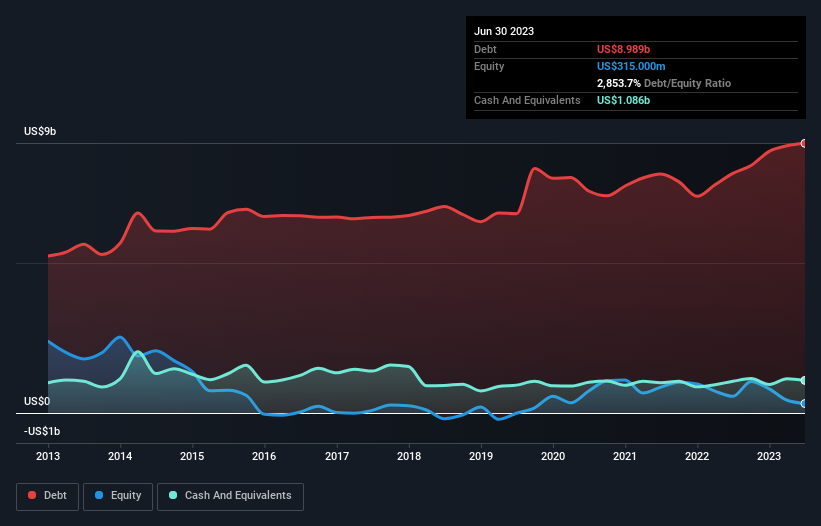- United States
- /
- Household Products
- /
- NYSE:CL
Does Colgate-Palmolive (NYSE:CL) Have A Healthy Balance Sheet?

David Iben put it well when he said, 'Volatility is not a risk we care about. What we care about is avoiding the permanent loss of capital.' So it might be obvious that you need to consider debt, when you think about how risky any given stock is, because too much debt can sink a company. As with many other companies Colgate-Palmolive Company (NYSE:CL) makes use of debt. But the more important question is: how much risk is that debt creating?
Why Does Debt Bring Risk?
Debt and other liabilities become risky for a business when it cannot easily fulfill those obligations, either with free cash flow or by raising capital at an attractive price. If things get really bad, the lenders can take control of the business. However, a more common (but still painful) scenario is that it has to raise new equity capital at a low price, thus permanently diluting shareholders. Of course, debt can be an important tool in businesses, particularly capital heavy businesses. The first step when considering a company's debt levels is to consider its cash and debt together.
See our latest analysis for Colgate-Palmolive
What Is Colgate-Palmolive's Debt?
You can click the graphic below for the historical numbers, but it shows that as of June 2023 Colgate-Palmolive had US$8.99b of debt, an increase on US$7.99b, over one year. However, it also had US$1.09b in cash, and so its net debt is US$7.90b.

How Strong Is Colgate-Palmolive's Balance Sheet?
The latest balance sheet data shows that Colgate-Palmolive had liabilities of US$4.63b due within a year, and liabilities of US$11.3b falling due after that. Offsetting this, it had US$1.09b in cash and US$1.66b in receivables that were due within 12 months. So its liabilities outweigh the sum of its cash and (near-term) receivables by US$13.2b.
While this might seem like a lot, it is not so bad since Colgate-Palmolive has a huge market capitalization of US$58.8b, and so it could probably strengthen its balance sheet by raising capital if it needed to. However, it is still worthwhile taking a close look at its ability to pay off debt.
In order to size up a company's debt relative to its earnings, we calculate its net debt divided by its earnings before interest, tax, depreciation, and amortization (EBITDA) and its earnings before interest and tax (EBIT) divided by its interest expense (its interest cover). This way, we consider both the absolute quantum of the debt, as well as the interest rates paid on it.
Colgate-Palmolive's net debt to EBITDA ratio of about 2.0 suggests only moderate use of debt. And its strong interest cover of 16.5 times, makes us even more comfortable. Sadly, Colgate-Palmolive's EBIT actually dropped 6.4% in the last year. If that earnings trend continues then its debt load will grow heavy like the heart of a polar bear watching its sole cub. The balance sheet is clearly the area to focus on when you are analysing debt. But it is future earnings, more than anything, that will determine Colgate-Palmolive's ability to maintain a healthy balance sheet going forward. So if you want to see what the professionals think, you might find this free report on analyst profit forecasts to be interesting.
Finally, a company can only pay off debt with cold hard cash, not accounting profits. So we clearly need to look at whether that EBIT is leading to corresponding free cash flow. Over the most recent three years, Colgate-Palmolive recorded free cash flow worth 68% of its EBIT, which is around normal, given free cash flow excludes interest and tax. This free cash flow puts the company in a good position to pay down debt, when appropriate.
Our View
On our analysis Colgate-Palmolive's interest cover should signal that it won't have too much trouble with its debt. But the other factors we noted above weren't so encouraging. For instance it seems like it has to struggle a bit to grow its EBIT. When we consider all the elements mentioned above, it seems to us that Colgate-Palmolive is managing its debt quite well. Having said that, the load is sufficiently heavy that we would recommend any shareholders keep a close eye on it. There's no doubt that we learn most about debt from the balance sheet. But ultimately, every company can contain risks that exist outside of the balance sheet. We've identified 3 warning signs with Colgate-Palmolive , and understanding them should be part of your investment process.
If, after all that, you're more interested in a fast growing company with a rock-solid balance sheet, then check out our list of net cash growth stocks without delay.
New: AI Stock Screener & Alerts
Our new AI Stock Screener scans the market every day to uncover opportunities.
• Dividend Powerhouses (3%+ Yield)
• Undervalued Small Caps with Insider Buying
• High growth Tech and AI Companies
Or build your own from over 50 metrics.
Have feedback on this article? Concerned about the content? Get in touch with us directly. Alternatively, email editorial-team (at) simplywallst.com.
This article by Simply Wall St is general in nature. We provide commentary based on historical data and analyst forecasts only using an unbiased methodology and our articles are not intended to be financial advice. It does not constitute a recommendation to buy or sell any stock, and does not take account of your objectives, or your financial situation. We aim to bring you long-term focused analysis driven by fundamental data. Note that our analysis may not factor in the latest price-sensitive company announcements or qualitative material. Simply Wall St has no position in any stocks mentioned.
About NYSE:CL
Colgate-Palmolive
Manufactures and sells consumer products in the United States and internationally.
Established dividend payer and good value.
Similar Companies
Market Insights
Community Narratives



